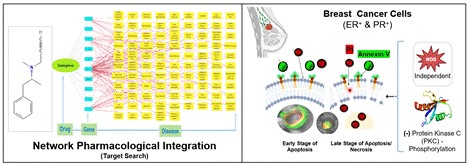An antidepressant drug has the potential of being repurposed to provide cost effective solution for treatment of breast cancer.
Due to expensive costs, long development times, and the requirement for drug trials and regulatory approvals, generating new and effective anticancer medications has been complex. However, biomedical scientists today frequently use medication repurposing for drug discovery.
Dr. Asis Bala and his team of researchers at the Institute of Advanced Study in Science and Technology (IASST) in Guwahati, an autonomous institute under the Department of Science & Technology (DST), Govt. of India, have been working in this field of drug repurposing to develop improved therapeutic strategies for cancer management.
This research group has shown that Selegiline (L-deprenyl), an antidepressant drug from a class of drugs called monoamine oxidase (MAO) inhibitors, might be applied as anticancer therapeutics for breast cancer.

Figure 1: Selegiline showed integrated networking with genes and diseases of different cancers. It also showed the inhibitory effect of PKC phosphorylation and ROS-independent apoptosis in breast cancer cells.
The integrated network pharmacological studies found that selegiline interacts with ten genes intricately linked to various types of cancer, with a significant number of nodes. The study conducted a preliminary comparative evaluation of the efficacy of selegiline on six cancer cell lines. Selegiline was found effective in killing estrogen and progesterone-positive (ER+ & PR+) as well as triple-negative breast cancer (TNBC).
It can induce cell death in breast cancer cells (ER+ & PR+) by a mechanism that does not depend on reactive oxygen species (ROS). Additionally, it inhibits a process called protein kinase C phosphorylation in breast cancer cells, which suggests that this process might be involved in the cell death caused by selegiline. This recent study, published in the journal “Medical Oncology,” could help biomedical scientists explore this area further. The research is the first of its kind and holds great significance in the field of cancer research. It deserves further investigation in terms of in vivo efficacy study, dose optimization, contraindications, and associated adverse side effects in the near future.
 Matribhumi Samachar English
Matribhumi Samachar English



